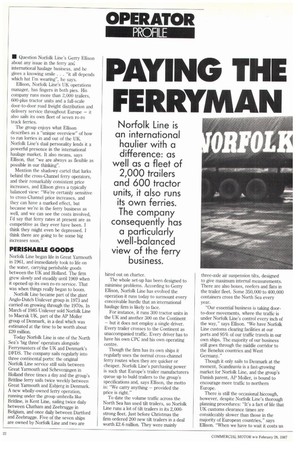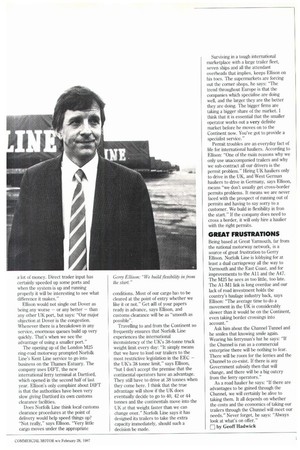PAYING THE FERRYMAN
Page 24

Page 25

If you've noticed an error in this article please click here to report it so we can fix it.
Norfolk Line is an international haulier with a difference: as well as a fleet of 2,000 trailers and 600 tractor units, it also runs its own ferries. The company consequently has a particularly well-balanced view of the ferry business.
• Question Norfolk Line's Gerry Ellison about any issue in the ferry and international haulage business, and he gives a knowing smile . . . "it all depends which hat I'm wearing", he says.
Ellison, Norfolk Line's UK operations manager, has fingers in both pies. His company runs more than 2,000 trailers, 600-plus tractor units and a full-scale door-to-door road freight distribution and delivery service throughout Europe — it also sails its own fleet of seven ro-ro truck ferries.
l'he group enjoys what Ellison describes as a "unique overview" of how to run lorries in and out of the UK. Norfolk Line's dual personality lends it a powerful presence in the international haulage market. It also means, says Ellison, that "we are always as flexible as possible in our thinking".
Mention the shadowy cartel that lurks behind the cross-Channel ferry operators, and their remarkably consistent price increases, and Ellison gives a typically balanced view: "We're certainly sensitive to cross-Channel price increases, and they can have a marked effect, but because we're in the ferry business as well, and we can see the costs involved, I'd say that ferry rates at present are as competitive as they ever have been. I think they might even be depressed. I think there are going to be some big increases soon."
PERISHABLE GOODS
Norfolk Line began life in Great Yarmouth in 1961, and immediately took to life on the water, carrying perishable goods between the UK and Holland. The firm grew slowly and steadily until 1969 when it opened up its own ro-ro service. That was when things really began to boom.
Norfolk Line became part of the giant Anglo-Dutch Unilever group in 1973 and carried on growing through the 1970s. In March of 1985 Unilever sold Norfolk Line to Maersk UK, part of the AP Moller group of Denmark, in a deal which was estimated at the time to be worth about 20 million.
Today Norfolk Line is one of the North Sea's 'big three' operators alongside Ferrymasters of the UK and Denmark's DFDS. The company sails regularly into three continental ports: the original Norfolk Line service still sails between Great Yarmouth and Scheveningen in Holland three times a day and the group's Britline ferry sails twice weekly between Great Yarmouth and Esbjerg in Denmark. A new wholly-owned ferry operation, running under the group umbrella like Britline, is Kent Line, sailing twice daily between Chatham and Zeebrugge in Belgium, and once daily between Dartford and Zeebrugge. Five of the seven ships are owned by Norfolk Line and two are hired out on charter.
The whole set-up has been designed to minimise problems. According to Gerry Ellison, Norfolk Line has evolved the operation it runs today to surmount every conceivable hurdle that an international haulage firm is likely to face.
For instance, it runs 300 tractor units in the UK and another 300 on the Continent — but it does not employ a single driver. Every trailer crosses to the Continent as unaccompanied traffic. Every driver has to have his own CPC and his own operating centre.
Though the firm has its own ships it regularly uses the normal cross-channel ferry routes when they are quicker or cheaper. Norfolk Line's purchasing power is such that Europe's trailer manufacturers queue up to build trailers to the group's specifications and, says Ellison, the motto is: "We carry anything — provided the price is right."
To date the volume traffic across the North Sea has used tilt trailers, so Norfolk Line runs a lot of tilt trailers in its 2,000strong fleet. Just before Christmas the firm ordered 200 new tilt trailers in a deal worth 22.6 million. They were mainly three-axle air suspension tilts, designed to give maximum internal measurements. There are also boxes, reefers and flats in the trailer fleet. Some 350,000 to 400,000 containers cross the North Sea every year.
"Our essential business is taking doorto-door movements, where the traffic is under Norfolk Line's control every inch of the way," says Ellison. "We have Norfolk Line customs clearing facilities at our ports and 95% of our traffic travels in our own ships. The majority of our business still goes through the middle corridor to the Benelux countries and West Germany."
Though it only sails to Denmark at the moment, Scandinavia is a fast-growing market for Norfolk Line, and the group's Danish parent, AP Moller, is bound to encourage more traffic to northern Europe.
There is still the occasional hiccough, however, despite Norfolk Line's thorough planning procedures: "It's a fact of life that UK customs clearance times are considerably slower than those in the majority of European countries," says Ellison. "When we have to wait it costs us a lot of money. Direct trader input has certainly speeded up some ports and when the system is up and running properly it will be interesting to see what difference it makes."
Ellison would not single out Dover as being any worse — or any better — than any other UK port, but says: "Our major objection at Dover is the congestion. Whenever there is a breakdown in any service, enormous queues build up very quickly. That's when we see the advantage of using a smaller port."
The opening up of the London M25 ring-road motorway prompted Norfolk Line's Kent Line service to go into business on the Thames Estuary. The company uses Dtvr, the new international ferry terminal at Dartford, which opened in the second half of last year. Ellison's only complaint about DIFT is that the authorities have been very slow giving Dartford its own customs clearance facilities.
Does Norfolk Line think local customs clearance procedures at the point of delivery would help speed things up? "Not really," says Ellison. "Very little cargo moves under the appropriate conditions. Most of our cargo has to be cleared at the point of entry whether we like it or not," Get all of your papers ready in advance, says Ellison, and customs clearance will be as "smooth as possible".
Travelling to and from the Continent so frequently ensures that Norfolk Line experiences the international inconsistency of the UK's 38-tonne truck weight limit every day: "It simply means that we have to load our trailers to the most restrictive legislation in the EEC — the UK's 38 tonne limit," says Ellison, "but I don't accept the premise that the continental operators have an advantage. They still have to drive at 38 tonnes when they come here. I think that the true advantage will show if the UK does eventually decide to go to 40, 42 or 44 tonnes and the continentals move into the UK at that weight faster than we can change over." Norfolk Line says it has designed its trailers to take the extra capacity immediately, should such a decision be made. Surviving in a tough international marketplace with a large trailer fleet, seven ships and all the attendant overheads that implies, keeps Ellison on his toes. The supermarkets are forcing out the corner shops, he says: "The trend throughout Europe is that the companies which specialise are doing well, and the larger they are the better they are doing. The bigger firms are taking a bigger share of the market. I think that it is essential that the smaller operator works out a very definite market before he moves on to the Continent now. You've got to provide a specialist service."
Permit troubles are an everyday fact of life for international hauliers, According to Ellison: "One of the main reasons why we only use unaccompanied trailers and why we sub-contract all our drivers is the permit problem," Hiring UK hauliers only to drive in the UK, and West German hauliers to drive in Germany, says Ellison, means "we don't usually get cross-border permits problems. It means we are never faced with the prospect of running out of permits and having to say sorry to a customer. We build in flexibility in fron the start." If the company does need to cross a border, it will only hire a haulier with the right permits.
GREAT FRUSTRATIONS
Being based at Great Yarmouth, far from the national motorway network, is a source of great frustration to Gerry Ellison. Norfolk Line is lobbying for at least a dual carriageway all the way to Yarmouth and the East Coast, and for improvements to the All and the A47. The M25 he sees as too little, too late. The Al-M1 link is long overdue and our lack of road investment holds the country's haulage industry back, says Ellison: "The average time to do a movement in the UK is considerably slower than it would be on the Continent, even taking border crossings into account."
Ask him about the Channel Tunnel and he smiles that knowing smile again. Wearing his ferryman's hat he says: "If the Chunnel is run as a commercial enterprise there will be nothing to fear. There will be room for the ferries and the Chunnel to co-exist. If there is any Government subsidy then that will change, and there will be a big outcry from the ferry operators."
As a road haulier he says: "If there are advantages to be gained through the Chunnel, we will certainly be alive to taking them. It all depends on whether the costs and the economics of taking our trailers through the Chunnel will meet our needs." Never forget, he says: "Always look at what's on offer."
[]by Geoff Hadwick
















































































































